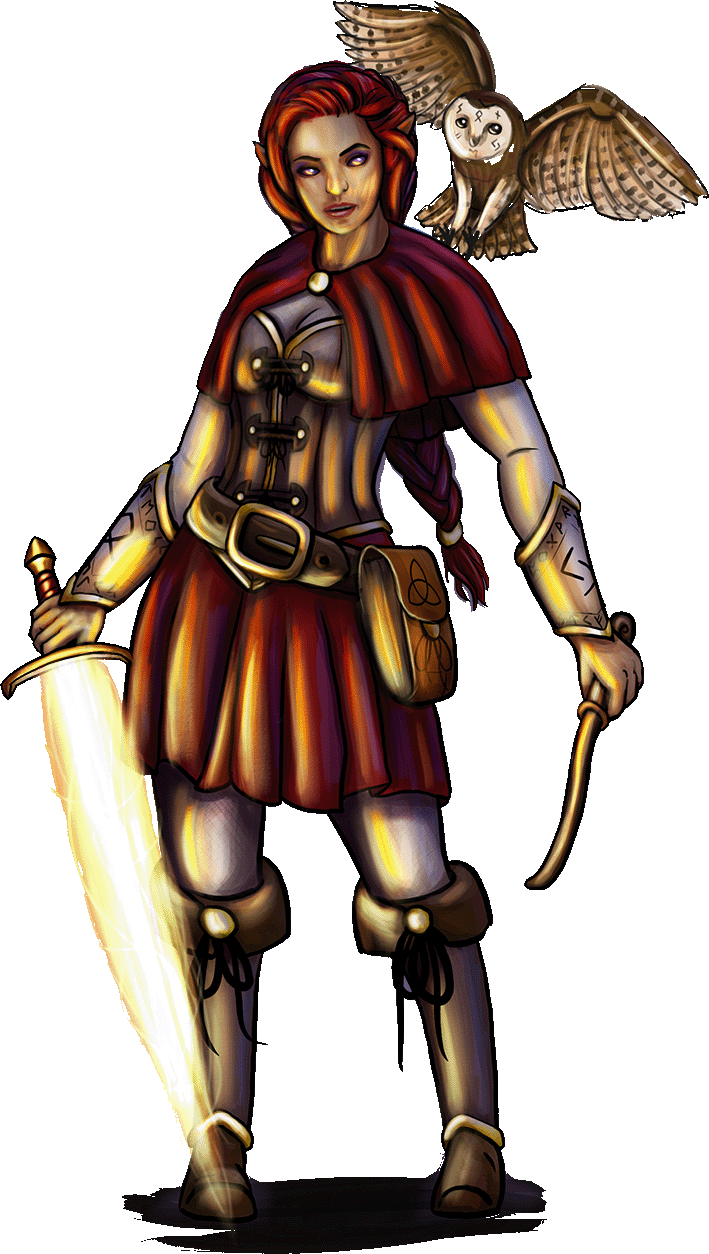
Lumiel Gallaeth, elven bladesinger
Wizards are the apex of arcane learning. Their spellbooks are as important to them as the fighter's weapon. A wizard pours their mind and soul into their book, and it serves as a secondary repository for the vast amount of knowledge needed to bend the Weave to their will.
They study the runes, which form the basis of arcane spellcasting, and seek to learn new applications and meanings of the runes. This is not an easy process, nor one that can be fully explained to an outsider. Each wizard expresses their spells slightly differently, which does not make the transfer of information any easier. This makes each wizard's spellbook a unique artifact, whose pages reflect its owner's experiences and idiosyncrasies.
Wizards have a firm belief that arcane magic is superior to other sources of magic, and that wizardry is the greatest form of that magic. True learning is far greater than the sorcerer's luck of the draw or the warlock's shadowy dealing. Druids are worthy of a certain respect, although their studies are misdirected. Clerics are just warlocks of a different flavor. Bards focus too much on form over function. Of course, the lowest rung on the ladder belongs to those poor dimwits who completely lack the ability to channel any magic at all.
The analytical mind of the wizard prepares for every eventuality and contingency, always working on an alternative plan in case their current one fails. This sometimes leads them to overthink their actions, and fail by inaction.
Wizards gain their power from their studies, either in tutored master-apprentice relationships, or from individual reading of magical books and scrolls, or experimentation with magical ingredients and substances. The search for true mastery over magic can take a lifetime, and some wizards look for a way to extend their allotted time, perhaps through unnatural means.
Subclasses
Most wizard subclasses focuses on a single spell school, studying ways of enhancing that particular aspect of magic.
Evoker
Some wizards regard evocation as the simplest school of magic, but even the most die-hard magical elitists cannot deny its effectiveness on the battlefield. A gifted evoker can find employment in many military organizations, hurling fire and ice around the battlefield. Dawnstar College trains many evokers who go on to serve in the Purple Legion.
Illusionist
Wizards who specialize in illusion magic are able to trick lesser minds into believing what the wizard wants them to believe. This can be used in many ways: to enhance a play with light and sound, to deceive and defraud for personal gain, or to hide from some great threat. Regardless, wizards of this school is often regarded with healthy scepticism by others. The curriculum at Abelin College contains more illusion magic than the other colleges of the Archivists.
Diviner
These wizards focus on unveiling information, either through research, ritual, or revelation. Their magic gives them some foresight into events to come, and their services are often sought by those who are about to start a major venture. Elves in particular seem to have a knack for divination magic, with the Stargarden being the premiere place of research for it.
Abjurer
Abjurers focus their study on protective magics, warding others from harm. Abjurers often find work as pseudo-healers, breaking curses and other magical effects on others. This school is especially popular among gnomes, and is taught by Blazefire College.
Bladesinger
This subclass has been reduxed.
Ideals
- Power: I require more magic to fulfill my goals. (Any)
- Magical Mastery: It is better to do it only once, flawlessly. (Neutral)
- Scholarship: If we do not write down our findings, who will further our research? (Lawful)
- Mentorship: We must serve as guides for the next generation of wizards. (Good)
- Superiority: I know I am better than others, and I do not care about them. (Evil)
- Mystery: I am most intrigued by arcane secrets that have been lost for centuries. (Chaotic)
Backstory Questions
- How did you learn of your arcane aptitude?
- What does your spellbook look like?
- What types of spells do you prefer?
- What is the name of your familiar? How did you earn its favor?
Wizards of the Past

Abelin Gemscribe, a famous gnomish wizard
Sira Blazefire (Archivists)
(half-elf wizard, LE, 1153-1307): Alchemist who discovered the process to make ashresin. She was a brilliant experimentalist, and also a fierce businesswoman, which made her fabulously wealthy. Sira funded much of the development of the Greystone Archive, which is built on the site of her laboratory. She wrote one of the fundamental treatises of alchemy.
Abelin Gemscribe (Archivists)
(gnome, NG, 1131-1279): Arcanist whose work on the properties of magical residue, ley lines, and demiplanes is the cause of many sleepless nights of study for Archivist students. Extremely gifted in his field, but rather dimwitted otherwise. He is said to have dined with Odin in Valhalla after accidentally opening a portal there. The unit of magical flux is named Abelin after him, and is defined to be the smallest iota of detectable magic. The amount of magical flux generated by spells varies greatly. A fireball emits a couple hundred Abelin, while even a minor illusion can put out several thousand Abelin in the area it affects.
Catiana Casta
(human, LN, 1004-1089): Teccan archmage who formulated Second Sun and first cast it at the Battle of the Midnight Sun, which ended the Corcaster Rebellion. Grandmother of Empress Herminia Casta, who was also a powerful wizard.
Aerilwyn Nilteril
(high elf, LN, 621-767) The greatest Bladesinger the world has ever known, and wielder of Nilisnebar. Renowned for her mastery of swordplay and air magic, Aerilwyn served the Teccan Empire as Legate-Commander of the Bladesinger Guard, one of the most elite units in their Legions and personal bodyguards to the Emperor. She died when she sacrificed herself to save her soldiers in a battle against white dragons on Iacaris, during a flare-up of the Dragon Wars.